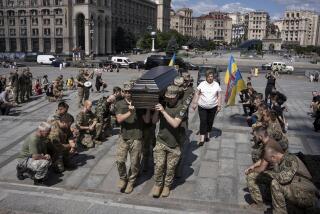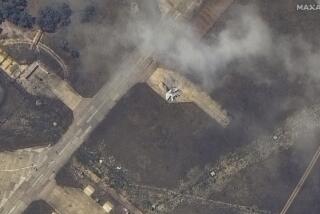Russia Bombs Chechen Oil Plant; Dudayev Seeks Talks
- Share via
GROZNY, Russia — Russian bombers hit a giant petroleum complex in Chechnya on Thursday, striking at the oil industry that is this breakaway republic’s economic lifeblood.
And as Russian warplanes and troops using laser-guided missiles intensified their attacks on the besieged city, Chechen President Dzhokar M. Dudayev reportedly told the Kremlin that he is ready for peace talks.
But it was unclear whether Dudayev was making another of the empty offers that Moscow and Grozny have repeatedly exchanged since Russia sent troops to crush Chechnya’s 3-year-old campaign for independence.
Chechen officials said Dudayev sent a telegram to Russian Prime Minister Viktor S. Chernomyrdin, saying he is willing to negotiate at any level with no preconditions.
After representatives in Chernomyrdin’s office said they had not received the telegram, Dudayev reportedly sent a similar one to President Boris N. Yeltsin.
In the Chechen capital of Grozny, a great black cloud loomed in the bright blue sky from the explosion at the oil refinery complex in the Karpinsky Kurgan district, on the southwestern outskirts of the city. Heavy bombing and shelling made it impossible to get close enough to the refinery to assess the damage.
At dusk, however, flames could be seen shooting out of the refinery, and there were unconfirmed reports that a bomb had landed on an oil tank. Russian Human Rights Commissioner Sergei A. Kovalev reported from Grozny that the blaze threatened to spread to nearby tanks of chlorine, ammonia and hydrogen.
The information war continued Thursday as Chechen authorities claimed that they had shot down three Russian aircraft, and Russians insisted that no planes had been hit.
Russian military officials said they had begun using laser-guided missiles to attack pro-Dudayev forces that brought tanks and heavy artillery out from the city center to confront the Russians. A Russian Defense Ministry official assured the Interfax news agency that these “smart bombs” would cause “virtually no civilian casualties.”
*
After a morning of ominous quiet, Russian warplanes roared repeatedly over the city. The thunder of their bombs reverberated against the largely deserted presidential palace, sending even hard-core Chechen guards scurrying for cover.
Dudayev was reported to be pinned inside a bomb shelter under the palace, and aides told reporters by telephone that they could not get out. Still, in the face of the overwhelmingly superior Russian force, the Chechen commandos remained defiant.
“Let the Russians bomb us all they want, they can’t kill all of us,” said Imran Abzuyev, commander of a Chechen unit. “We have no way back, we’ll stand to the end.”
Abzuyev was patrolling the central open-air market in Grozny to enforce a new ban on once lively weapons sales there. Chechens were allowed only to exchange their arms for others, he said.
The ban appeared aimed at preventing Chechen deserters from selling their weapons and running off with the money--a crack in the usual facade of united anti-Russian defenses.
In Grozny too, 10 days of Russian bombing was taking its toll.
With the water system knocked out, residents lined up at street-side pumps with buckets that they had to lug back to their apartments.
Lines for bread spilled into the street. With most women and children evacuated, the majority of residents left in town appeared to be elderly Russians with nowhere else to go. Their slow, stoic progress through Grozny’s streets to line up for water or bread never wavered, even as bombs landed nearby.
*
“I built the whole city,” said Nikolai Yefremov, a 68-year-old construction engineer who remained in his fourth-floor apartment in central Grozny while his family was sheltered in the basement. “Now, before my eyes, it’s all being destroyed, and my tears flow.”
In the snowy courtyard of his building, where pigeons and dogs picked at spilled garbage, history professor Mikhail Parkhomenko was returning with two full buckets from the water pump at a nearby stadium.
The refinery bombing had scared him badly, he said, because the smoke resembled the mushroom cloud of a nuclear bomb.
But all in all, his mood was not bad. When the bombing gets bad, he said, he and his ethnic Chechen friends sit in the basement and talk about life in general and women in particular.
“Everyone we talk to says they are for a peaceful political resolution of the problem,” said Parkhomenko, a bright-eyed man in a black fedora.
Others met the bombing with less equanimity.
Magomed Khashiyu, a gold-toothed man of 55, declaimed in full voice at the central market that “Yeltsin is not a man, he’s a prostitute.”
Khashiyu was referring to Yeltsin’s promise Tuesday that Russia would stop hitting civilian targets in Chechnya--a vow that was followed by two days of relentless bombing of central Grozny.
Chechen soldiers did say, however, that most of the Russian bombing was aimed at concentrations of Chechen fighters in what resembled a semi-civilized “war of position” of the 19th Century more than the internecine conflicts of the 20th Century.
“Yes, we are bombing, but only a group of armed militants,” Russian Defense Minister Pavel S. Grachev told reporters at the Russian base in Mozdok, Northern Ossetia. “I will fire a thousand shots to their one shot, a thousand shells to one shell of theirs.”
The Russians had left open the road southeast from Grozny to Dagestan to accommodate refugee traffic and to encourage less-than-enthusiastic Chechen youth to leave rather than fight. Russian officials said flyers had been dropped over Grozny promising safe passage out of the city for anyone holding a leaflet, but they insisted that Chechen fighters are not allowing anyone with a weapon to leave.
*
As Russia has bombed Chechen targets, it has also announced aid packages to help with the human cost of the war--as though providing bandages for wounds it has inflicted.
Kovalev, the human rights commissioner who has remained in Grozny to protest the Russian attack, begged for antibiotics to prevent the many wounded from developing gangrene or peritonitis.
Humanitarian organizations began asking for canned food, warm clothing, money and medicines.
Tatiana Regent, head of the Federal Migration Service, said 37,000 officially registered refugees are now scattered across Dagestan, Ingushetia and in outlying regions of Chechnya.
She said more than 105,000 people have fled Chechnya in the last two weeks. Many are being sheltered by relatives or friends, but 2,000 to 2,500 new refugees have been appealing to Russian officials for help every day.
The agency estimates that 200,000 ethnic Russians have also fled Chechnya in the three years since it declared a unilateral independence from Russia that has never been recognized by other nations.
These people, propelled from their homes by growing anti-Russian sentiment, will probably never go back and will require resettlement, Regent said.
Russia has requested U.N. refugee assistance for the thousands who have fled the fighting, U.N. Secretary General Boutros Boutros-Ghali said Thursday. He said he has asked the U.N. refugee agency to field a mission in the region.
As the war entered its 19th day, Russian officials also began to count the financial toll.
Critics of the intervention wondered where the cash-strapped government would get the money to rebuild Chechnya without triggering a catastrophic rise in inflation, now running about 15% per month.
The refugee service said $9.8 million in additional funding will be needed in the next four weeks alone. The Railways Ministry said restoring the republic’s blown-up and much-robbed railroad will require $30 million. The Finance Ministry calculated defense expenditures at $987 million in 1995 if hostilities continue at the current level.
Finally, the Economics Ministry presented a $203-million list of repairs needed to restore Chechnya’s oil industry--and that was before the bombing of the refinery complex.
In Soviet times, Chechnya each year refined up to 18 million tons of Caspian basin oil pumped in by pipeline from Azerbaijan, but almost nothing was produced in 1994 because of a Russian economic blockade.
The republic’s own oil reserves are estimated at 50 million tons, considered modest by Russian standards.
Goldberg reported from Grozny, Efron from Moscow.
More to Read
Sign up for Essential California
The most important California stories and recommendations in your inbox every morning.
You may occasionally receive promotional content from the Los Angeles Times.













